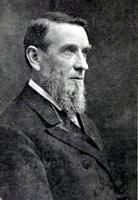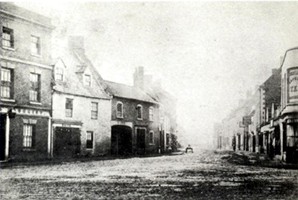 |
|
Sir George White and the cobbler's shop where her was born in
1840.
The cobbler's son
who became a knight
of the realm
by REX NEEDLE
|
A working class background is often the catalyst for a successful career, providing the motivation and drive necessary to make a mark in life. One such man who was born a cobblers' son above a shop in Bourne on 13th March 1840, became highly respected in many areas, notably education, religion and the temperance movement, and rose to become a prominent businessman, Sheriff of Norwich, Member of Parliament and knight of the realm. He was George White, son of Thomas White, boot and shoe maker, and his wife, Mary, of West Street, who was educated at the Old Grammar School and worshipped at the Congregational Chapel [now the United Reformed Church] in Eastgate, deriving his later interest in both politics and religion from his father. On leaving school at 15, George joined his father in the shop but the following year he left the family business and became a junior clerk at Tillyard & Howlett at their boot and shoe factory in Norwich for eight shillings a week. He was industrious and ambitious and anxious to advance his prospects, spending his spare time on improving his education with two hours before breakfast each morning learning mathematics and languages from a local solicitor while in the evenings taking Greek lessons from his pastor. At the age of twenty, he was appointed a commercial traveller for the northern and eastern counties which often proved to be a difficult task with his colleagues on the road because he had taken the pledge of abstinence at seventeen and the custom of the time was each to drink what he liked and the expense to be equally divided among all the representatives at the table. Young Mr White always refused to drink or to pay any of the bill and many times the company present tried to exclude him from the table or, failing that, to serve him with anything yet he lived to see the custom abolished. He returned to Norwich to take over the shoe department at the age of 24 and his dedication brought a steady progress through the company until 1875 when he became a partner, later being appointed chairman and managing director by which time the firm had 2,000 employees and had become the largest footwear manufacturers in Britain. White was hugely influential in the efforts of the Norwich shoe manufacturers to convert shoe making in the city from a cottage industry based on outworking to one where mass production was the norm. In 1863 he married Anne (1836-98), daughter of Henry Ransome of Norwich, and they had seven daughters and a son, George Ernest, who followed his father in service at Howlett & White, the Norwich Liberal Party and the Baptist movement. By this time White had become a leading non-conformist, a member of St Mary's Baptist Church at Norwich where he also served as deacon and Sunday school superintendent. On Sunday mornings, he ran an adult school for bible study and the 250 working men who attended were devoted to him. He was also an active Sunday school worker for more than half a century and for several years, he and his wife and their eight children and three servants would leave the house empty every Sunday afternoon and migrate in a body to a nearby mission school in which all thirteen of them participated in the activities of the day. In 1876 he was elected to Norwich City Council where he specialised in education, becoming chairman of the Norwich School Board and in 1903, the George White School was named in his honour. He was also appointed an alderman and served as Sheriff in 1888. White was elected as the Liberal member of Parliament for North West Norfolk in 1900, a seat which he held until his death twelve years later, and continued to work for social reform and free education for all, his achievements being acknowledged when he was knighted in 1907 and in 1910 he was awarded the Freedom of the City of Norwich. He had begun attending Sunday School in Bourne at the Congregational School in Eastgate as a lad of four and by the age of 15 he had become a teacher. But after leaving to pursue his career in Norwich, he was invited back on two occasions, in 1900, then Alderman George White, to give the dedication address at the opening of the new Sunday School building and again in 1911, then Sir Gilbert White, to attend the celebrations marking completion of extensive alterations to the church which he opened with a silver key. Sir George died at his home in Unthank Road, Norwich on Saturday 11th May 1912 after an illness from lung cancer lasting several months. He was 72. The funeral on May 15th was reported to be "one of the most extraordinary manifestations of sympathy and public interest ever witnessed in Norwich". Following a private service at his home and a public memorial service at St Mary's Baptist Church, he was buried at the Rosary cemetery witnessed by a crowd of some 3,000 gathered on the slopes around the grave which was piled high with floral tributes, a remarkable end to a remarkable life. Unfortunately, George White’s life and career are largely unknown in Bourne and although there is little opportunity to remember such dedication to public service, perhaps the town council might now think it worthwhile to name a street in memory of someone who despite his humble background, spent his life trying to better the lot of his fellow man. |
